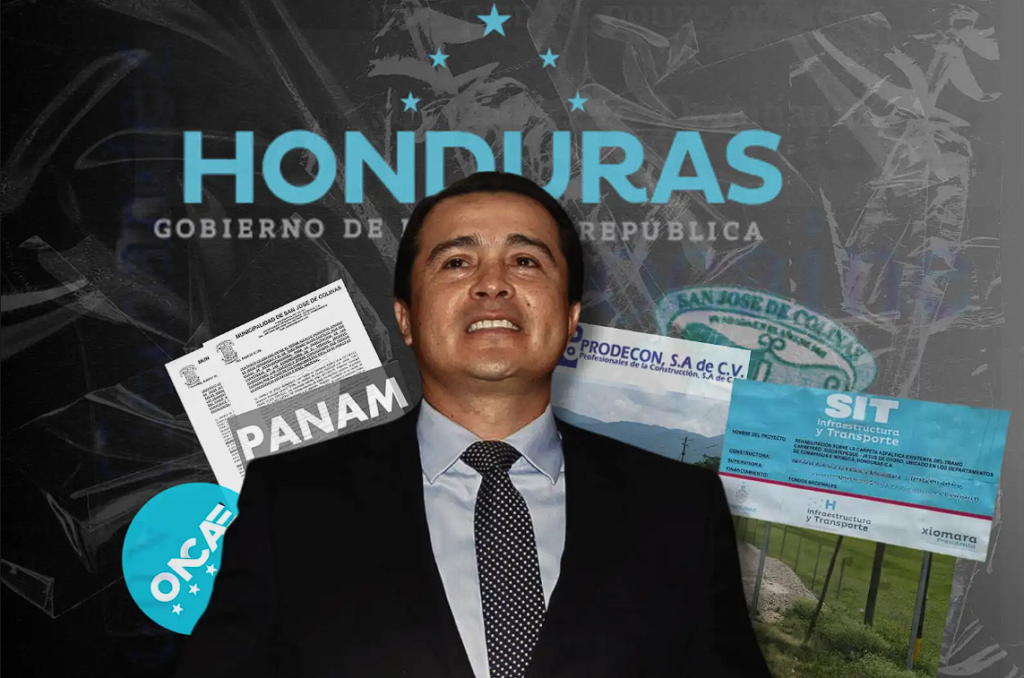When President Xiomara Castro took office in 2022, she made a commitment to eradicate the influence of drug trafficking in Honduran institutions. However, three companies that have been investigated by the US Department of Justice in relation to the Tony Hernandez case continue to operate without restrictions: one holds million-dollar state contracts, another was designated as a state contractor, and the third received contracts in 2020 from a politician who holds a high position in the current government.
Text: Fernando Silva
Editing: Vienna Herrera
Cover: Persy Cabrera
In February 2019, the US Department of Justice requested legal assistance from the Honduran Attorney General’s Office in providing company records and contracts related to Juan Antonio “Tony” Hernández Alvarado and his associates. Based on testimonies, telephone records, and other investigations, it identified 30 “subjects of investigation,” including natural persons and companies.
Tony and his brother, former President Juan Orlando Hernández, were convicted of drug trafficking in the US in 2021 and 2024, respectively.
Contracorriente found that at least two companies linked to Tony Hernández’s drug and arms trafficking investigations have received benefits from the current administration, becoming state contractors and securing contracts for the construction of roads.
In addition, a third company, which had already benefited from direct contracting in the previous administration, continues to obtain benefits under shady conditions through high-ranking officials of the current government.
Tradeco and Contratista Panamericana Certification
On November 23, 2018, at 12:35 pm, an agent of the Drug Enforcement Administration (DEA) took Tony’s statement after his arrest at Miami International Airport.
The questioning, in which Tony had the opportunity to collaborate, became one of the most notable events regarding Tony’s involvement in drug trafficking; for example, the revelation that cocaine loads were marked with his initials, “TH”.
In this context, Tony explained to the DEA agent that one of the reasons for traveling to that city was to meet with Carlos Gonzales Macias, then vice-president of Tradeco, a Mexican business conglomerate, which has been under investigation for corruption and for receiving multiple irregular contracts in its country of origin. The contracts amounted to about 20 billion Mexican pesos, according to reports from the Mexican press.
Tony explained that Tradeco wanted to “invest in Honduras” but had not been able to because public-private alliances “had a monopoly,” so he promised to arrange a meeting with a government official to facilitate a deal.
The request for assistance states that, according to bank records in the US, Gonzales Macias was also linked to other companies of Grupo Tradeco, such as Tradeco Infraestructura S.A de C.V, Tradeco Ingenieria, S.A. de C.V., Tradeco Infrastructure, Inc., Itecsa LLC, Advantix Payroll LLC, Cometa USA Inc., and Ledergy LLC.
The document also states that one of the phones seized from Tony contained documents related to business dealings with the Mexican company Grupo Tradeco and another Honduran company, Profesionales de la Construcción S.A. de C.V. (Prodecon).
Although Tradeco was not listed as a state contractor by September 2024, the current administration, through the Secretariat of Transparency and Anti-Corruption, had designated Contratista Panamericana S.A. de C.V. as a state contractor on July 31.
Tradeco’s president, Federico Alberto Martínez Urmeneta, and legal representative in Honduras, Mexican national Armando Alberto Herrera Barrientos, are business associates of Contratista Panamericana.
According to Honducompras, a website that provides a list of state contractors, the company began operating in Honduras in December 2023. However, the website states that it was founded in 2005 and has carried out works and projects in several countries, including Mexico, Guatemala, Honduras, El Salvador, Panama, Colombia, Guyana, Suriname, Ecuador, and Uruguay.
Oficina Normativa de Contratación y Adquisiciones del Estado (ONCAE), the institution overseeing public contracts, did not respond to interview requests and inquiries about certifications issued to companies with ties to organized crime.
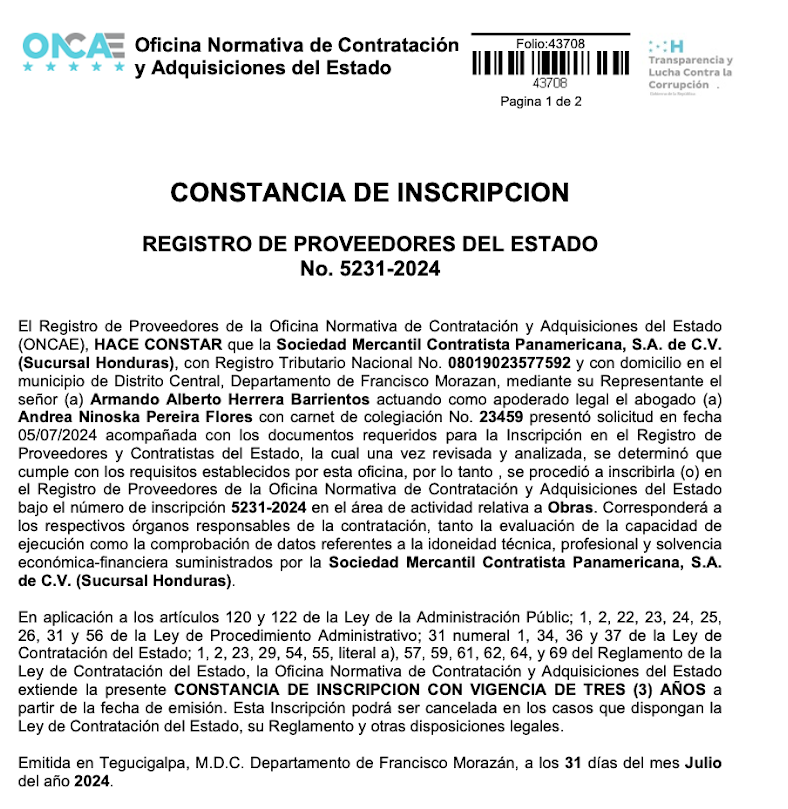
On its website, Contratista Panamericana states that, among other things, it specializes in building penitentiary centers. It won the bid for building the Terrorist Confinement Center (CECOT) in El Salvador, which is known for allegedly committing human rights violations and for being the largest prison in the continent; and a maximum-security prison in Masagua, Guatemala, which was expected to start operating in mid-August.
Last year, Tradeco was under investigation for influence peddling in connection to Costa Rican President Rodrigo Chávez, a former member of his government, and a current one. According to Costa Rican news outlets, the Attorney General’s Office opened an investigation to determine if public works contracts were granted through influence peddling and if there were external pressures to benefit Tradeco. Its legal representative affirmed having met with Chávez, media reports say. Tradeco also bid unsuccessfully for the construction of a maximum-security prison in Panama.
In July 2024, amid controversy over the construction of a maximum-security prison in Islas del Cine, Contratista Panamericana was designated as a state contractor. Despite studies that warned of the possible damage to the endemic flora and fauna, the project was approved without an environmental permit. However, Ramiro Fernando Muñoz, head of Honduras’ military police and the National Penitentiary Institute, announced on two occasions that the process failed and a new bidding would start soon.
Contratista Panamericana and Grupo Tradeco’s communications office told Contracorriente that their incorporation in Honduras is due to “the country’s keen interest in infrastructure investments and similarities with Mexican markets,” and that it neither participated in a bidding process nor has thought of a specific project in Honduras. The companies also dissociated themselves from Tony Hernández. Requests for comment to Muñoz through his assistant went unanswered.
Although there is no detailed information on Contratista Panamericana’s planned investments in Honduras and ONCAE’s registry only states that it is engaged in “overseeing projects,” Tradeco tried to secure contracts with the Honduran government before. In 2010, Tradeco Infraestructura S.A. de C.V., a subsidiary of Grupo Tradeco, won a lawsuit over noncompliance with a 2003 contract to repair the highway between Puerto Cortes (Honduras’ main port) and Guatemala, and was awarded 430.8 million lempiras.
Prodecon’s highways
The US Department of Justice requested information on Prodecon during the investigation against Tony Hernández and his associates after US authorities found commercial agreements with that company in his phone.
According to the website Portales de Contrataciones Abiertas de Honduras, which lists all government contracts, between 2014 and 2021, during the administration of Juan Orlando Hernández, Prodecon received 21 contracts from Fondo Vial (the government highway fund), the Secretariat of Infrastructure and Public Services (INSEP), and INVESTH, a government unit that manages development projects and programs.
Relations between the government and Contratista Panamericana continued after Hernández’s presidential term ended. Between March and April 2023, the Secretariat of Infrastructure and Transport (SIT) awarded the company six contracts – valued at about $2.78 million – for the construction of several infrastructure works.
The most important contract listed on the website is valued at 54.5 million lempiras and consisted in repairing a highway system in the Atlántida department – a stretch of road that extends from Puente Lean to the municipality of Jutiapa. Repairs concluded in October 2023, according to local press reports.
Moreover, the government awarded Prodecon another contract without listing it on the website. In December 2022, SIT tasked the company with repairing the stretch of highway between Jesús de Otoro and La Esperanza in the Intibucá department. The contract is worth about 331.7 million lempiras and has been delayed multiple times, as reported by news outlets. Prodecon claims delays are due to lack of payments.
Rixi Moncada, presidential candidate of the ruling party and secretary of defense, criticized the delays on X, “[. . .] the highway is destroyed, and the population is demanding an explanation for the delays.” Prodecon faced widespread criticism during the previous administration for not finishing public works on time.
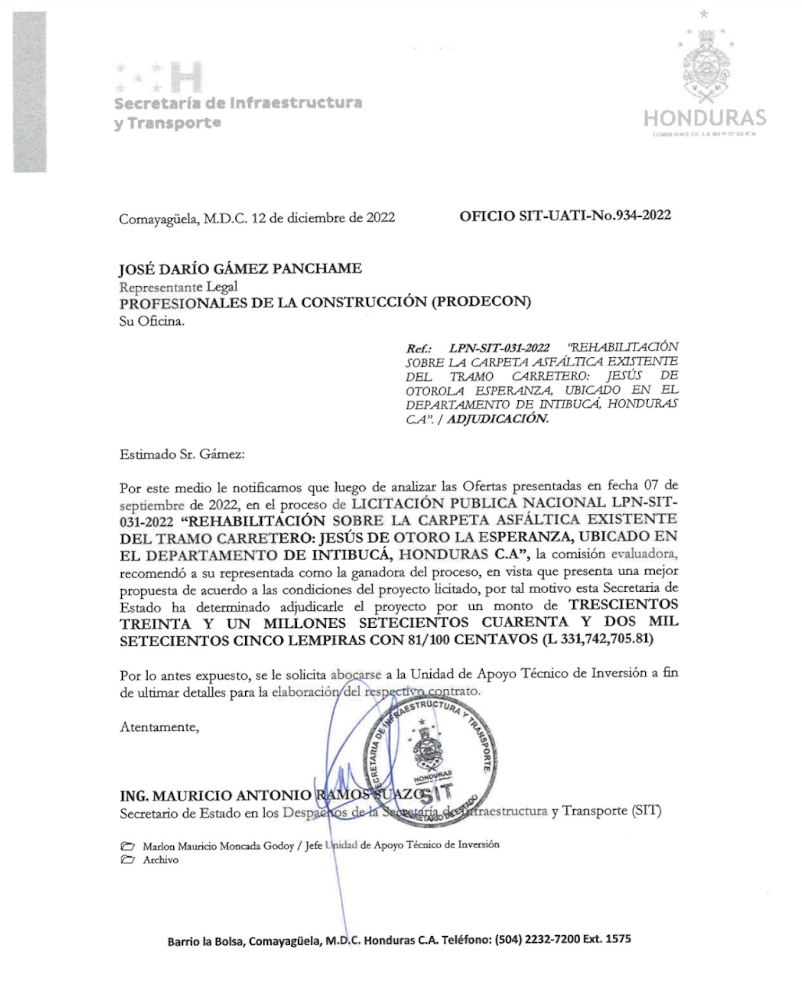
Contracorriente found that the Castro government has awarded contracts worth 400 million lempiras to Prodecon, a company that had business relations with Tony Hernández, according to the US Department of Justice.
Contracorriente attempted to contact Octavio Pineda, secretary of infrastructure and transport, and Prodecon, but requests for comment went unanswered.
In 2008, Prodecon was favored during the administration of José Manuel Zelaya Rosales. On August 1, José Rosario Bonano – then secretary of public works, transport and housing – signed a $11.8 million contract with the company to repair the highway CA-5.
Bonano has been under investigation by the Attorney General’s Office since 2011 over irregularities in the asphalting project La Esperanza-Marcala. In October 2022, a trial court dismissed an attempt by Bonano to find protection in an amnesty decree, which had granted immunity to several officials of the Zelaya Rosales government accused of corruption.
According to the Chamber of Commerce, Prodecon was founded by members of the Gamez Panchame family in 1979. Its current general manager and legal representative, José Dario Gamez Panchame, is the former manager of Empresa Nacional Portuaria (a company that oversees all national ports), former congressional representative and regional vice-coordinator of Porfirio Lobo Sosa’s 2009 presidential campaign.
In 2021, Tomás Zambrano, congressional representative of the National Party, denounced Prodecon, saying, “negligence and bad practices in the construction of the bridge over the Guacirope river have resulted in precariousness for locals, passers-by, companies and neighbors of the Nacaome municipality, as well as the rest of inhabitants of southern Honduras.” Prior to Zambrano’s remarks, Gamez Panchame had been under investigation by Honduras’ Anti-Corruption Council (CNA) over irregularities in contracts while heading Empresa Nacional Portuaria.
Gamez Panchame became part of Tony and Juan Orlando Hernández’s inner circle after selling a property to Javier René Barrientos Alvarado – retired brigade general and cohort of the former president from military school in 1983 – in Villanueva, Cortés department. Gamez then worked closely with the Hernández brothers from the time Juan Orlando served as president of the National Assembly in 2010 till Alvarado’s appointment as air force commanding general in 2019. He was one of the three generals summoned to testify in Juan Orlando’s favor in February of this year.
Ties to the brokerage firm Ucles Martínez
In November 2018, Tony and Marlon Pacheco Morales – his friend and lawyer, according to news reports – traveled to the US. Tony wanted to meet with Honduran businessman Theo Franz Uclés, to whom he referred as a “friend.” Uclés had traveled to Nebraska to purchase two secondhand trucks and refurbish them.
According to the US request for assistance, Uclés maintained contact with an individual in the US who had been arrested for money laundering in 2017, though the charges were later dropped. Uclés’s flight schedule showed that he had booked a flight from Miami International Airport in late November 2018, but he wasn’t on that flight. He allegedly avoided customs officials by taking connecting flights in Costa Rica, Honduras, and Panama on December 11.
Contracorriente also found that Uclés was part of a scheme involving offshore front companies in Panama and acted as the legal representative of the companies Office 77-602, S.A. and Office 77-603, S.A. According to an anonymous social media complaint from 2018, the purpose of this scheme was to launder money.
On May 13, 2004, Theo Franz Uclés, Aná Elizabeth Uclés and Belky Judith Martínez founded the insurance brokerage firm Correduría de Seguros Uclés Martínez. It went from being a limited liability company to a corporation after Tony’s arrest in 2019. The transition was undertaken by Rebeca Lizeth Melara Ráquel, lawyer and daughter of the president of Honduras’ Supreme Court. According to media reports, Ráquel was under investigation by the Directorate for the Fight Against Drug Trafficking for representing a company linked to Ramón Matta Waldurraga, a Honduran national who faced aggravated money laundering charges in Honduras and pled guilty to drug conspiracy charges in a US court in 2018.
The Supreme Court’s president appointment was endorsed by the Libre Party, of which she is an active member, even though she was mentioned in a CNA report filed to the court’s nominating committee for incorporating the Jerico Mining Company. The report found that in 2018 the Technical Criminal Investigation Agency (ATIC) issued an arrest warrant for the company owner, Alberto Muccioli Ordoñez, over alleged ties to drug trafficking and money laundering in connection to the late Wilkin Montalván Mejía.
In 2012, during Xiomara Castro’s first presidential campaign, Uclés ran for the Central American Parliament as a member of the Libre Party. In November 2020, in the aftermath of hurricanes Eta and Iota – which caused devastation throughout the country – he received two contracts from the mayor’s office in San José de Colinas, Santa Barbara department. Mayor Amable de Jesus Hernández, member of the Libre Party, awarded Uclés a $5,800 contract to supply water to neighborhoods and a $8,548 contract to repair highways in communities supposedly affected by the hurricanes.
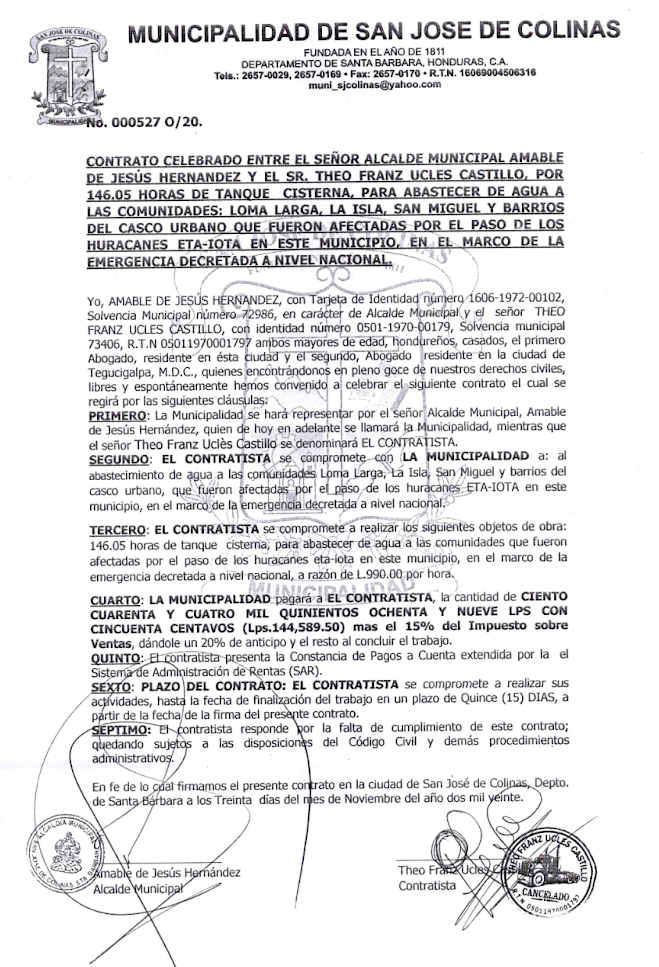
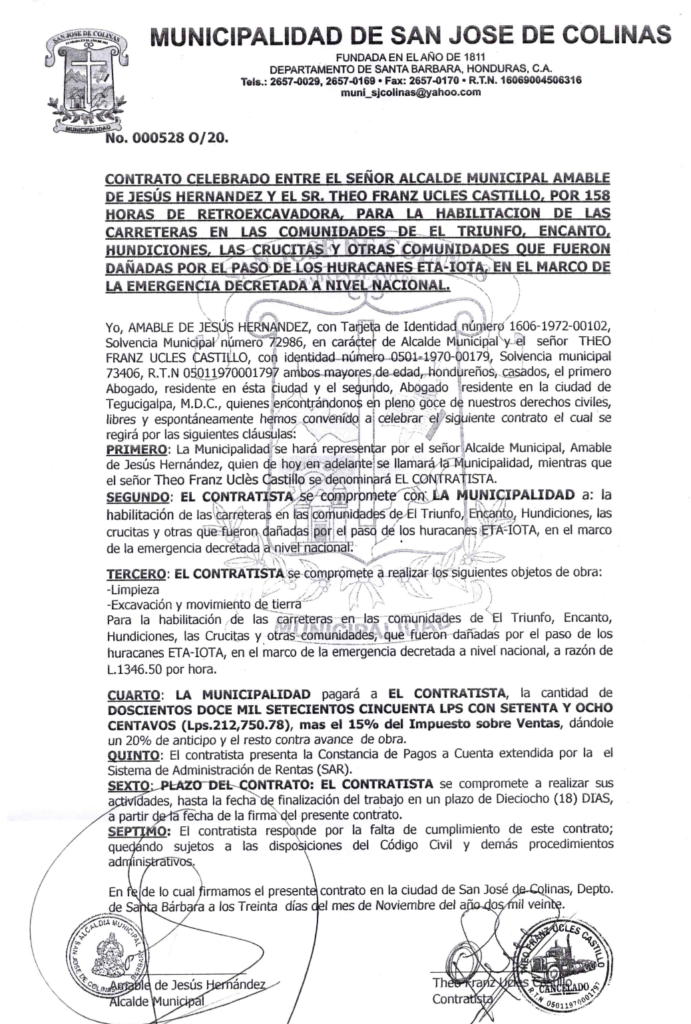
Jesus Hernández has served as a public official for 26 years, initially with the Liberal Party and then with the Libre Party. After President Castro took office, he was appointed as director of Honduras’ Pension Fund (INJUPEMP). Contracorriente has reported irregularities in the management of this institution.
According to an anonymous source, the brokerage firm took part in mediations to grant an insurance contract to INJUPEMP. The latter allocated 3.5 million lempiras for securing various insurance contracts, according to its budget plan for 2022.
This institution organized a public bidding in July of this year and recommended that the contract be awarded to Seguros Atlántida y Seguros Continental, according to Honducompras, but the contract was not made available to the public.
Even though the brokerage firm is registered as an insurance intermediary by the National Commission of Banks and Securities (CNBS), its address and telephone numbers have not been disclosed to the public.
Contracorriente contacted two insurance regulators: Honduras’ Insurance Chamber (CAHDA) and the Honduran Association of Professional Insurers (AHPROINESE). CAHDA stressed that they have no ties with Uclés and haven’t had any contact with him in 10 years while AHPROINESE stated that they’re no longer in contact with the brokerage firm.
Contracorriente also sent an email with questions to the firm, but they didn’t reply.
By September 5, 2024, the brokerage firm was listed on CNBS’s website, including Theo Uclés as its representative. However, following Contracorriente’s inquiries to regulatory agencies and persons familiar with the case, the listing had been removed by September 8.
Amable de Jesus Hernández and INJUPEMP’s public relations officer did not respond to requests for comment.
In the aftermath of Insight Crime’s article showing a video of Carlos Zelaya, brother-in-law of President Castro and former secretary of the National Assembly, discussing bribes with drug traffickers, this investigation’s findings suggest that the current government has very close ties to organized crime, contrary to the official narrative.
This investigation was carried out with support from the Consortium to Support Independent Journalism in Latin America (CAPIR), which is led by the Institute of War and Peace Reporting (IWPR).

